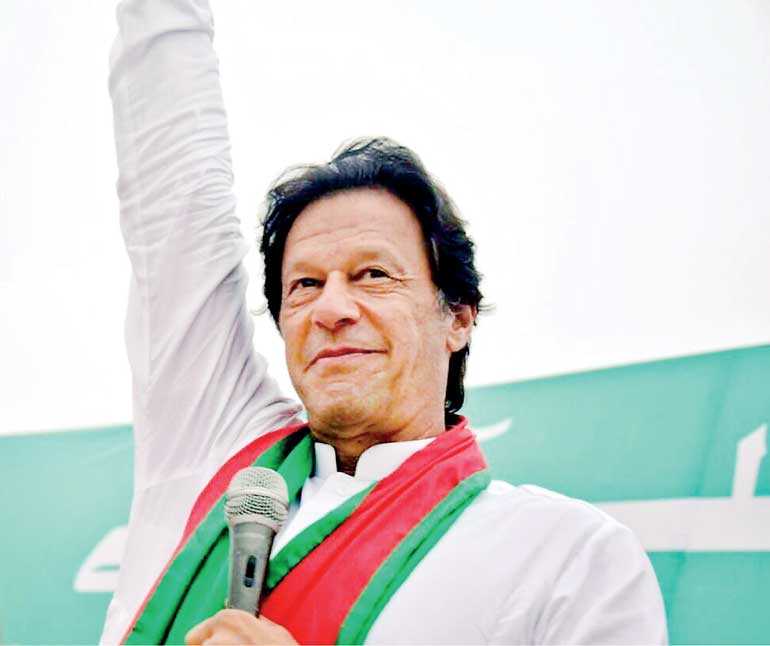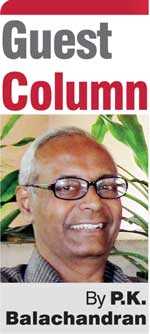Saturday Feb 21, 2026
Saturday Feb 21, 2026
Saturday, 21 July 2018 00:10 - - {{hitsCtrl.values.hits}}

Imran Khan, the Pakistani cricket star, anti-corruption crusader and politician, appears to be within reach of his cherished goal of winning the 25 July Pakistan National Assembly (NA) elections and becoming Prime Minister.
But the political history of Pakistan shows that politicians come to power with one attractive credential or the other, but eventually end up losing it either because they turn out to be corrupt and vindictive earning the people’s wrath or they lose the support of the powerful army, which has its own vested interests to safeguard. Pakistan has had three military coups and four phases of military rule since it came into existence 71 years ago.
Imran Khan is today an anti-corruption icon and appears to be having the backing of the Army. But it remains to be seen as to how long his image of being pure as driven snow remains unsullied, and how long his domestic and foreign policies accord with those of the army.
Jockeying for power is constant and endemic in Pakistan and in a match between the civilian politician and the army, the winner is invariably the army. Thus, Imran’s political career which appears to be bright now, may well follow the dismal Pakistani pattern. Having a reputation of being an agitator and a street fighter, Imran might find it difficult to walk the tight rope vis-à-vis the Army.
Main contenders
By all accounts, Imran’s Pakistan Tehreeq-e-Insaf (PTI) party is the strongest contender among the three outfits in the field. The other two are the Pakistan Muslim League-Nawaz (PML-N) led by the family of former Prime Minister Nawaz Sharif, and the Pakistan Peoples’ Party(PPP) led by Bilawal Bhutto and Asif Ali Zardari, son and husband respectively of former Prime Minister Benazir Bhutto.
The PML (N) has no prime ministerial candidate yet. Nawaz Sharif would have been the obvious candidate. But last year, the Supreme Court had banned him from holding public office following revelations in the Panama Papers of 2015. This year, he was jailed for 10 years by the Accountability Court.
The PML (N) is also divided. Nawaz’s brother Shehbaz Sharif is accused by a section of the party of not coming to his aid when he was arrested on arrival in Lahore from the UK. The expected big crowd and Shehbaz himself were not there at the airport.
Seeing the writing on the wall, and especially after it became clear that the Army is backing Imran Khan’s PTI, some leaders of PML (N) have joined Imran’s party. Moreover, the PML (N) is no longer in government, Pakistan being under a pre-election caretaker government. And without State power, the PML (N) is a toothless tiger.
The Pakistan People’s Party (PPP) is but a pale shadow of what it was at the time of its founder Zulfikar Ali Bhutto and his daughter Benazir Bhutto. The present Co-Chairman, Bilawal Bhutto, has little to his credit other than his ancestry.
His father and Co-Chairman of the PPP, Asif Ali Zardari, has been named the PPP’s prime ministerial candidate. But he was known to be highly corrupt and nicknamed “Mr. 10 percent,” when his wife, Benazir Bhutto, was Prime Minister. Zardari does not fit the bill at the present juncture when corruption is the main election issue.
Decks cleared
After more than two-decades in active politics, Imran Khan has now been able to clear the decks for a win.
He has harnessed “supernatural” power by marrying his “spiritual soothsaying guru” Bushra Maneka, who had convinced him that marriage to her would lead him to the pinnacle of Pakistani politics. He had successfully led a long agitation to remove the patently corrupt Nawaz Sharif from the Premiership and jail him. Imran has succeeded in making his pet theme “corruption” the main issue in the 25 July elections.
Army backing
And, most importantly, he has acquired the backing of the most powerful institution in Pakistan, namely, the Army.
“I think a democratic government rules from moral authority. And if you don’t have moral authority, then those who have the physical authority assert themselves. In my opinion, the army is a Pakistani Army and not an enemy army. I will carry the Army with me,” Imran told an interviewer.
Unlike Nawaz Sharif, who had fallen out with the Army over the issue of peace with India and lost power twice because of that, Imran has consistently praised the Army and acknowledged its stabilising role in Pakistani politics and governance.
About the current Army Chief Gen. Qmar Javed Bajwa, Imran said: “It’s the first time that I am seeing an Army Chief saying time and again that he will ensure free and fair elections, which is the one thing we want. It is music to our ears.”
He blames corrupt and irresponsible civilian leaders and neighbouring India and Afghanistan for the entry of the Army into Pakistani politics and governance.
“The hostility of India and Afghanistan toward Pakistan forces the military to play an outsize role in the country. I have very clear foreign policy objectives, and where there are security concerns of the Army, we will address them. It is our army.”
 On another occasion, Imran declared that nothing can be done in Pakistan by maligning the Army and rhetorically declared: “Now is the time to decide whether we want to be used by the enemy and turn against the Pakistan Army. The country will not survive if the Army does not.”
On another occasion, Imran declared that nothing can be done in Pakistan by maligning the Army and rhetorically declared: “Now is the time to decide whether we want to be used by the enemy and turn against the Pakistan Army. The country will not survive if the Army does not.”
In 2013 Imran had accused at least one officer of the Military Intelligence of rigging the Parliamentary elections in Punjab, but later absolved the Army as such by blaming it on one particular officer, Brig. Muzzafar Ali Ranjha. Imran was close to the extremist former Inter-Services Intelligence Chief Gen. Hamid Gul who he had hailed as a “Mujahid” (one who strives for the cause of God).
Nawaz Sharif had dubbed Imran as the “ladla” or the “pet” of the Army. Sharif’s daughter Maryam Nawaz had dubbed him a “stooge”. But Imran retorted saying that Sharif was “brought up on the lap of Gen. Zia-ul-Haq,” the military dictator of the 1980s who Islamised Pakistan. Subsequently, Sharif had used Army financial backing to rig elections in 1990.
In 2012 the Supreme Court had officially ruled that two Army Generals, Mirza Aslam Baig, and Asad Durrani (head of ISI) along with President Ghulam Ishaq Khan had provided financial assistance to Sharif’s campaign in 1990.
In 1993 the then Army Chief Gen. Abdul Waheed Kakar persuaded both President Ghulam Ishaq Khan and Prime Minister Sharif to step down. During his second term, which began in 1997, Sharif replaced Army Chief Gen. Jahangir Karamat and appointed Gen. Pervez Musharraf in 1998. But Musharraf sacked the Prime Minister in 1999 because of his soft policy towards India and opposition to the Kargil war with India.
However, Sharif came back to power though elections held in 2013. He allegedly had the Army’s support. The Army wanted an end to the squabbling coalition government of 2008-2013. From 2015 onwards, the opposition was unable to put up with Shareef’s corruption and the Army became insecure following his meetings with Indian Prime Minister Narendra Modi.
History of Army interventions
Pakistan has a long history of seeking the help of the Army to restore governance made dysfunctional by squabbling politicians. It was political confusion and frequent changes in government which brought the Army into the game for the first time in 1958.Since then there have been three successful military coups and four periods of military rule.
Pakistani politicians have made it a habit to hobnob with the military and use them to achieve their narrow political ends. The military naturally takes advantage of this and dictates terms, which the politicians generally accept. In case they don’t or they fail to live up the Army’s expectations or fall out of line, they would get thrown out, either through a coup or through electoral rigging.